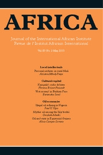
AFRICA
Scope & Guideline
Connecting Disciplines, Transforming Understanding
Introduction
Aims and Scopes
- Interdisciplinary Research on African Societies:
The journal encourages contributions that span multiple disciplines, including anthropology, sociology, history, and political science, to provide comprehensive analyses of African contexts. - Focus on Postcolonial Studies:
A significant portion of the journal's content engages with themes of colonial legacies, decolonization processes, and contemporary implications of historical injustices in Africa. - Exploration of Gender and Identity:
The journal features research that critically examines gender roles, identities, and struggles within various African contexts, highlighting the intersectionality of race, class, and sexuality. - Economic and Political Dynamics:
The journal addresses pressing economic and political issues, including governance, development policies, and the impact of globalization on African nations. - Cultural Expressions and Practices:
There is a consistent focus on the cultural dimensions of African life, including literature, music, and oral traditions, as well as their roles in shaping societal values and identities. - Urban Studies and Migration:
The journal explores urbanization trends, migration patterns, and their social implications, particularly in relation to informal economies and urban livelihoods.
Trending and Emerging
- Digital Media and Technology Studies:
There is a growing interest in how digital media and technology shape social interactions, identities, and cultural expressions in Africa, reflecting global digital trends. - Environmental Issues and Climate Change:
Research focusing on environmental challenges, climate change impacts, and local adaptation strategies is becoming increasingly prevalent, highlighting the urgency of these issues for African societies. - Migration and Transnationalism:
The exploration of migration patterns, both internal and transnational, is on the rise, emphasizing the complex narratives surrounding mobility, identity, and belonging. - Health and Disability Studies:
Emerging discussions around health, disability rights, and access to healthcare are becoming more prominent, reflecting a broader concern for social justice and equity in health. - Urbanization and Informality:
The journal is increasingly publishing research that examines urbanization processes, the informal economy, and the lived experiences of urban dwellers, particularly in rapidly growing cities. - Politics of Identity and Belonging:
Themes exploring identity politics, belonging, and the implications of race, ethnicity, and nationalism are gaining momentum, reflecting contemporary social dynamics in various African contexts.
Declining or Waning
- Traditional Histories and Colonial Narratives:
There appears to be a waning focus on purely traditional historical accounts of colonialism, as newer research trends favor interdisciplinary approaches that integrate contemporary societal issues. - Simplistic Economic Analyses:
The journal has moved away from overly simplistic economic frameworks that do not account for the complexities of informal economies and local agency in African contexts. - Homogenized Representations of African Experiences:
There is a diminishing trend towards generalizing African experiences under singular narratives, as the journal increasingly emphasizes the diversity and specificity of local contexts. - Static Gender Roles in Analysis:
Research that portrays gender roles in a static manner without considering evolving dynamics and intersectionality is becoming less prevalent, as scholars push for more nuanced discussions. - Historical Exclusivity in Studies:
Themes that focus exclusively on historical events without linking them to contemporary issues or implications are being overshadowed by research that demonstrates the relevance of history to current challenges.
Similar Journals
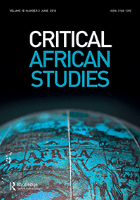
Critical African Studies
Advancing Critical Discourse on African IssuesCritical African Studies, published by TAYLOR & FRANCIS LTD, is a premier journal dedicated to advancing the discourse on critical issues affecting Africa and its diaspora. With an ISSN of 2168-1392 and an E-ISSN of 2040-7211, this journal has established itself as a leading publication in the field of Arts and Humanities, ranked Q1 in Arts and Humanities (miscellaneous) and Q2 in Social Sciences (miscellaneous) as of 2023, showcasing its commitment to high-quality research. Over its converged years from 2015 to 2024, it has become a critical platform for scholars and practitioners to explore diverse perspectives, innovative ideas, and multidisciplinary approaches to issues such as social justice, governance, and cultural narratives within the African context. The journal's Scopus rankings reflect its significant impact, with impressive placements in both the Arts and Humanities and Social Sciences categories. Critical African Studies aims to foster a robust dialogue among researchers, professionals, and students, making it essential reading for anyone interested in the complexities of Africa's socio-political landscape and cultural heritage.

French Studies in Southern Africa
Exploring the Intersections of French Culture and Southern Africa.French Studies in Southern Africa is a premier journal dedicated to advancing the field of French studies within the Southern African context. Published by the Association of French Studies in Southern Africa, this journal serves as a vital platform for scholars, researchers, and students engaged in exploring the rich intercultural dynamics, historical perspectives, and contemporary challenges of French language and literature in the region. With a focus on fostering academic discourse, French Studies in Southern Africa showcases original research articles, critical essays, and book reviews, contributing significantly to the understanding of Francophone cultures. While the journal is not open access, its rigorous peer-review process ensures high-quality scholarship that is essential for anyone involved in French studies or interested in the socio-cultural intersections of France and Southern Africa. By supporting the dissemination of knowledge and encouraging collaboration, this journal plays a crucial role in enhancing the visibility of French studies in Southern Africa.
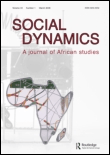
Social Dynamics-A Journal of African Studies
Exploring the Pulse of Africa's Social LandscapeSocial Dynamics: A Journal of African Studies, published by Routledge Journals, Taylor & Francis Ltd, serves as a vital platform for discourse on contemporary issues affecting the African continent. With an ISSN of 0253-3952 and an E-ISSN of 1940-7874, this journal has been disseminating high-quality research since 1975 and converges through to 2024. It holds a commendable standing within the academic community, ranked in the Q3 quartile of social sciences and positioned at #344 out of 604 in its Scopus category. The journal aims to explore interdisciplinary themes that resonate within the social sciences, offering insights on the dynamic cultural, political, and economic landscapes of Africa. While the journal currently does not offer Open Access, its contributions remain indispensable for researchers, professionals, and students seeking to engage with the complexities of African studies and global implications. The journal's address is 2-4 Park Square, Milton Park, Abingdon OX14 4RN, Oxon, England, underscoring its commitment to scholarly excellence from the UK.
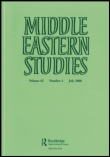
MIDDLE EASTERN STUDIES
Advancing Multidisciplinary Perspectives on the RegionMIDDLE EASTERN STUDIES is a prestigious journal published by Routledge Journals, Taylor & Francis Ltd, focusing on the multidisciplinary examination of the Middle East from historical, cultural, geographical, sociopolitical, and developmental perspectives. With a convergence of research spanning over six decades (1964-2024), this journal seeks to present innovative scholarship that deepens the understanding of Middle Eastern dynamics, making it a vital resource for researchers, professionals, and students alike. It holds notable recognition in various academic fields, evidenced by its Q2 ranking in Cultural Studies and Q1 in History as of 2023, demonstrating its impact and relevance. Although it operates under a traditional subscription model, MIDDLE EASTERN STUDIES remains committed to enhancing academic discussions and fostering knowledge exchange within the international research community. As a trusted source for empirical studies and theoretical frameworks, this journal plays a crucial role in illuminating the complexities of the region and its global interactions.
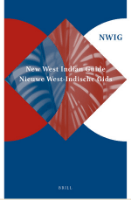
NWIG-New West Indian Guide-Nieuwe West-Indische Gids
Connecting Cultures: Where Caribbean Scholarship Meets Global Discourse.NWIG-New West Indian Guide-Nieuwe West-Indische Gids is a prestigious academic journal published by KITLV PRESS in the Netherlands, dedicated to advancing knowledge in the realms of history, cultural studies, and social sciences. Established in 1977, the journal has consistently provided a platform for scholarly discourse, focusing on the Caribbean and its multifaceted histories, cultures, and societies. With an Open Access model adopted since 2013, it ensures widespread dissemination of critical research that appeals to a diverse academic audience. In 2023, the journal has been recognized with notable quartiles, ranking in Q2 for both cultural studies and history, underscoring its significance in the field. Researchers and students alike can benefit from its vast collection of articles exploring important themes relevant to the Caribbean context and beyond, fostering a deeper understanding of the region's impact on global narratives. For a comprehensive and enriching scholarly experience, NWIG invites submissions that push the boundaries of current knowledge and encourage interdisciplinary engagement.
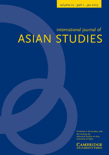
International Journal of Asian Studies
Connecting Scholars Through Asian NarrativesThe International Journal of Asian Studies, published by Cambridge University Press, stands as a pivotal platform for scholars exploring the complexities and dynamics of Asian societies. With an ISSN of 1479-5914 and an E-ISSN of 1479-5922, this journal began its journey in 1996 and has actively contributed to the field through a range of multidisciplinary research articles, fostering engagement in both the Arts and Humanities and Social Sciences. Holding a respectable Q2 category in Arts and Humanities and a Q3 category in Social Sciences for the year 2023, it is recognized for its critical insights and scholarly contributions, earning a rank of 40/173 in Arts and Humanities and 174/275 in Social Sciences within Scopus metrics. Researchers seeking to address contemporary issues in Asian studies will find invaluable access to this forum, which not only presents rigorous academic discourse but also aims to bridge cultural and social narratives across the Asian continent.

Southern African Humanities
Unveiling the rich tapestry of Southern African history.Southern African Humanities is an esteemed academic journal published by the Natal Museum, dedicated to advancing the fields of anthropology, archaeology, and cultural studies with a particular focus on the Southern African context. Since its inception in 2008, the journal has consistently provided a platform for innovative research and scholarly discourse, earning a prominent reputation with a 2023 impact factor that places it in the Q2 and Q1 quartiles across multiple relevant categories, including Anthropology, Archaeology, and History. The journal is recognized for its rigorous peer-review process and dissemination of high-caliber research, exemplified by its Scopus rankings, which reflect its widespread influence within the humanities. Although it does not currently offer open access options, the journal remains pivotal for researchers, professionals, and students aiming to deepen their understanding of Southern African cultures and historical contexts. Located in Pietermaritzburg, South Africa, Southern African Humanities continues to be an essential resource for those engaged in the humanities, enhancing knowledge and fostering research collaborations within the region and beyond.
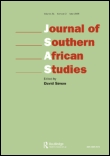
JOURNAL OF SOUTHERN AFRICAN STUDIES
Engaging Scholars in the Heart of Southern African ResearchThe JOURNAL OF SOUTHERN AFRICAN STUDIES, published by Routledge Journals, Taylor & Francis Ltd, is a premier scholarly outlet dedicated to the exploration and analysis of social, political, and cultural dynamics affecting the Southern African region. With an established history since 1974, this journal features articles that contribute significantly to various disciplines, including Arts and Humanities, Sociology, and Geography, and is recognized within its fields as evidenced by its Q2 and Q3 quartile rankings in the latest assessments. Offering a rich academic platform for researchers, professionals, and students, it fosters interdisciplinary approaches and welcomes critical discourse on contemporary issues, ensuring relevance and impact in today's rapidly changing socio-political landscape. Notably, the journal has achieved commendable rankings on Scopus, affirming its standing as an influential source of knowledge. Although not open access, it remains a vital resource for those seeking to deepen their understanding of Southern Africa and its global implications.
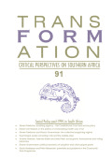
Transformation-Critical Perspectives on Southern Africa
Exploring transformative insights for a dynamic Southern Africa.Transformation-Critical Perspectives on Southern Africa (ISSN: 0258-7696; E-ISSN: 1726-1368), published by the University of KwaZulu-Natal, stands as a vital platform for scholarly discourse in the sphere of Southern African studies. With a focus on transformative issues and critical perspectives, this journal aims to explore socio-economic, political, and cultural dynamics within the region, offering insightful analyses that contribute to ongoing debates and policy-making. Though not open access, it remains an essential resource for researchers and practitioners seeking to understand the complexities of transformation in Southern Africa. The journal’s commitment to quality research fosters a deeper understanding of the region’s challenges and opportunities, making it indispensable for academics, students, and professionals dedicated to social change and development in the Southern African context. Its address, located at King George V Ave, Glenwood, Durban, KwaZulu-Natal 4041, South Africa, positions it centrally within one of the continent’s key academic hubs.
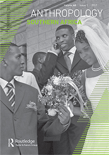
Anthropology Southern Africa
Exploring diverse cultural narratives through rigorous scholarship.Anthropology Southern Africa is a prestigious journal published by Routledge Journals, Taylor & Francis Ltd, and is dedicated to advancing the field of anthropology through rigorous scholarship and critical discourse. Established in 2013 and converging through 2024, this journal sets a high standard in its category, currently holding a Q2 classification in Anthropology and a Q1 ranking in Cultural Studies for the year 2023, ensuring its position as a significant contributor to social science research. With a robust Scopus ranking that places it in the 82nd percentile for Cultural Studies and the 67th percentile for Anthropology, Anthropology Southern Africa serves as an essential platform for researchers, professionals, and students engaged in anthropological inquiry and cultural analysis. Although it is not openly accessible, the publication prides itself on high-quality submissions that explore diverse cultural phenomena and anthropological perspectives, thereby inviting interdisciplinary engagement and fostering a global academic dialogue.